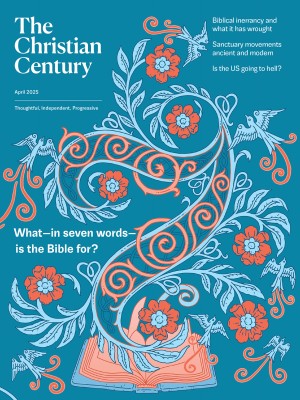April 18, Good Friday (John 18:1-19:42)
Good Friday is an annual reminder to ask who is crucified in our midst to distract from the crimes of those in power.
The most effective way to bring folks together is to give them a real good enemy.
The film Wicked, adapted from the Broadway musical and novel of the same name, is not shy about speaking to the current political moment. In the film, protagonist Elphaba—despised and feared by family and peers alike for the green hue of her skin—seeks the counsel of the “great and terrible” Wizard of Oz when she learns of the disenfranchisement of animals. Rather than help Elphaba protect the rights of the animals, however, the Wizard reveals himself to be the one behind the campaign against them.
Elphaba also discovers that the Wizard has no real magical powers and relies on propaganda about hated others to distract people from this fact. He blames Oz’s problems on animals’ participation in society and manages to unite the people of Oz under this assumption. Despite Elphaba’s efforts to stand up for the animals, she herself becomes an enemy of the Wizard, and thus an enemy of Oz. Dripping with bloodlust, the people chase her out of town.
Read our latest issue or browse back issues.
Jesus knows this sort of scapegoating well. By John’s account of events, Jesus’ arrest, trial, crucifixion, and death are an absurd spectacle of propaganda. By their own admission, Caiaphas and other religious authorities cannot execute Jesus for his alleged crimes. Pilate, a Roman official in charge of sentencing, attempts multiple times to pin a crime on Jesus but cannot come up with anything—until Jesus seems to confirm that he threatens Roman rule. All signs point to his innocence, yet the crowds, the high priest, and Pilate all seem to be united behind his execution.
Crucifixion was the Roman Empire’s execution method of choice for rebels and insurrectionists. It was reserved for those whom the empire considered the lowest of the low, for those who threatened the status quo and questioned the legitimacy of the powerful. It was meant to be a public spectacle, a warning to all those watching that they would receive the same fate if they dared exalt anyone higher than Caesar. And this is the way that Jesus died: on the cross, as a despised rebel and enemy of the Roman Empire, in solidarity with the oppressed, with crowds of people rubbernecking from a distance.
Perhaps this was precisely what the empire and the religious leaders found so threatening about Jesus—the way he subverted the norms that kept them in power. His love for others wasn’t the saccharine love of a children’s lesson or the banal love of a fairy tale. It was a love that transcended boundaries that the empire had constructed to preserve their own power. It was a love that stood in solidarity with those considered other. It was a radical love that, at its core, critiqued the power of the unjust. And it was, for this reason, that Jesus died an unjust death.
The tragedy of Good Friday is that the tale of scapegoating and condemning innocents to die plays out in multiple contexts, in multiple eras, and in multiple ways. Unjust leaders will always seek to unite people against a real good enemy, in the interest of self-preservation. Good Friday is an annual reminder to consider who is scapegoated in our time for the benefit of those who inflict violence against God’s people, to ask who is crucified in our midst to distract from the crimes of those with institutional power.
In the 2024 national election, transgender Americans fit the bill of a real good enemy to unite against. Politicians claimed that trans people are predisposed to grooming children for abuse and that trans women are a threat to women’s sports. Meanwhile at the state level, trans folks faced an onslaught of 50 new anti-trans laws across 17 states last year, barring them from participating in sports, from using the bathroom that corresponds to their gender identity, from accessing life-saving care, and from participating in services receiving state funding. What’s more, trans people have long been subject to violent crime at disproportionate rates. Trans women of color are more likely to be murdered than cisgender women, and 47 percent of trans people report being sexually assaulted in their lifetime.
What would it look like to resist the scapegoating of trans people as a real good enemy and to stand in solidarity with them instead? What might it feel like to sit with trans folks in the pain of these atrocities, as Jesus’ mother, his aunt, and Mary Magdalene sat at the foot of the cross when all others had fled?
To make meaning out of Jesus’ crucifixion is not to jump to the joys of Easter Sunday for easy answers. Rather, it is to pause in the pain with the crucified in our midst. Jesus’ execution was not an isolated event with strictly spiritual implications. It was a bodily, painful death in solidarity with the oppressed. Only when we see Jesus in the oppressed among us can we truly make meaning of the cross for our lives today. Only when we choose to risk it all for the crucified among us can we know the true meaning of Jesus’ love.






